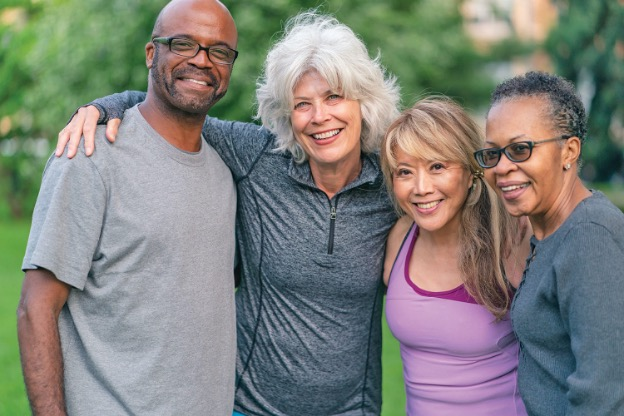Here’s how — and why — to rekindle friendships if you’ve been isolated or out of touch.
We are wired to be social. Just think how good it feels to have a nice chat with a friend. Those feelings can be hard to come by if your loved ones are far away or you’ve lost touch with friends. The pandemic has made social contact especially difficult for the last two years.
But the benefits of an active social life are significant, going beyond warm, fuzzy feelings. Connection brings a treasure trove of important health benefits and cognitive perks. And if you’ve been more isolated or out of touch with friends lately, it’s time to take back your social life and reap the rewards.
Connection and cognition
Many studies suggest that having strong social networks (friends who support or help you) or taking part in social activities is associated with a reduced risk of developing cognitive impairment and dementia.
For example, a study of more 66,000 people in Europe and Israel (average age 70), published online Oct. 25, 2021, by Ageing & Society, found that people with the highest levels of social connectedness (good friends) and engagement (activities) had the highest scores on cognition tests, compared with people who had the lowest levels of social connectedness and engagement.
And an earlier study of 1,100 adults (average age about 80) followed for five years found that the people who were the most socially active had 70% less cognitive decline compared with those who had the lowest rates of social activities.
These studies were observational and don’t prove conclusively that socializing protects cognition, but we know that it engages the brain in ways that promote better cognition. “Social activities cause us to use our brains more than almost any other activity,” says Dr. Andrew Budson, a neurologist and chief of Cognitive and Behavioral Neurology at VA Boston Healthcare System. “All of our senses — vision, hearing, smell — are engaged during social activities. We process people’s facial expression, body language, tone of voice, and speech content, and analyze what’s being said and the emotions behind the words. In turn, that influences how we react: our facial expression, body language, tone of voice, speech, and actions. Putting the brain to work like that strengthens the connections between brain cells and creates new ones, too.”
Other health benefits
Beyond cognition, socialization also appears to help with the following aspects of health.
Longevity. Being social protects us against loneliness and isolation, which are associated with chronic disease and premature death.
Stress reduction. “People are emotion regulators. When someone you trust listens to you, you can feel your body calm down. Your blood pressure returns to baseline, your levels of stress hormones decrease. It takes us out of ‘fight or flight’ mode, which can gradually break down the body if we’re stressed all the time,” says Dr. Robert Waldinger, a psychiatrist with Harvard-affiliated Massachusetts General Hospital.
Mood. “The way people react to you reminds you of aspects of yourself, aspects that you may forget. It gets you out of your own head and your worries, and reinforces your sense of being competent. That boosts your mood,” Dr. Waldinger notes. “And connecting with people you haven’t spoken to in a long time can remind you that you have this history with these people, you belong to this group, and you matter. That also boosts mood.”
Reach out to friends
All of us tend to lose touch with old friends. People move; circumstances change. But it’s worth the effort to have some social interaction in your life, even if it’s not in person.
How do you get the ball rolling? Dr. Waldinger suggests something low-key. “Send a card, an email, a text, or a message on Facebook,” he says. “You just want to see if someone might reply.”
What should you say in the initial contact, especially if it’s been a long time? “Just say you’re thinking of the person and want to see how they’re doing,” Dr. Waldinger advises.
Other icebreakers include saying you were thinking about how you used to do a particular activity together, or sharing a nice memory of something you both experienced, such as a graduation or a successful project. You might even include a one- or two-sentence update on how you’re doing and what you’ve been up to lately.
What happens next? “See if the person reciprocates,” Dr. Waldinger says. “If so, build from there. Ask if the person would like to have coffee or take a walk with you sometime soon. If the person is far away, ask they’re available for a catch-up phone call or video chat.”
Keep up the connection
It may take time to rebuild the closeness or the frequency of contact you once had with a friend, if that’s what you both want. So be patient, and keep reaching out to the person.
How much contact will it take to boost your cognition and health? “We don’t have an amount of social connection that is ‘enough’ or a lower amount that is ‘not enough.’ Studies suggest that more is better, and some is better than none for improving your thinking and memory,” Dr. Budson says.
So why not rekindle several friendships? If they bring you joy, and if they offer important, healthy side effects, then you have nothing to lose and much to gain.

